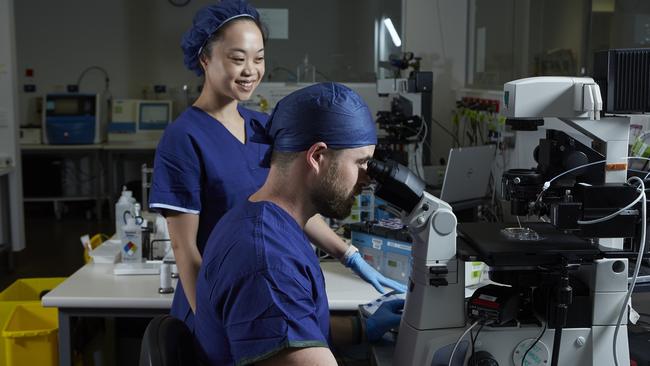IVF and tech teams develop AI tool for male infertility
A new artificial intelligence tool has been created that will help infertile men have biological children via an IVF procedure.
Victoria
Don't miss out on the headlines from Victoria. Followed categories will be added to My News.
Artificial intelligence may soon help infertile men achieve a biological child of their own.
The Australian developers of a new tool say it is the first time AI has been used to help with surgical sperm detection as part of an IVF procedure.
AI is already used to help predict the likelihood of a viable pregnancy in women having IVF.
This latest AI tool was developed by University of Technology Sydney start-up NeoGenix Biosciences run by Steven Vasilescu with the help of his brother Phillip in collaboration with IVFAustralia.
The developers hope the tool can help with the most severe form of male factor infertility, azoospermia. This is where little or no sperm is produced, a condition that affects around five per cent of infertile couples seeking fertility treatment in Australia.
The team described the tool as an algorithm that uses AI-powered image analysis that has been trained to identify “in seconds” sperm shapes and forms.
Embryologist Dale Goss from IVFAustralia presented the team’s early research overnight at the annual meeting of the European Society of Human Reproduction and Embryology in Copenhagen, Denmark.

Mr Goss said using the algorithm will help an embryologist clarify if sperm is present in a tissue sample and also if it is viable for a common IVF procedure called intracytoplasmic sperm injection (ICSI). This is where a single sperm is injected directly into an egg.
“We are confident this works,” he said.
“We have tested it on four patients using their sperm to create the imaging to do a test on the capability.
“This is a proof-of-concept test, and a clinical trial study is needed to compare an embryologist’s efficacy and usefulness versus the AI.”
He said it is hoped the clinical trial could start by the end of the year.
“Every doctor we talk to asks for this to happen as soon as possible to help improve fertilisation rates for these patients,” Mr Goss said.
“It is an area of improvement that every clinic shares as there are no alternatives and it is an antiquated process to find sperm.
“Men would still need surgery (to obtain a tissue sample), but this might help prevent them doing multiple surgeries because AI helps identify viable sperm.”
Mr Goss says the tool can also dramatically reduce processing times for surgical sperm patients to seconds rather than hours.
“It can take an embryologist six hours to look through the partially shredded tissue samples using a fine needle and microscope to search for sperm,” he said.
He said the AI tool would assist, not replace the embryologist.
“What we have made is an algorithm trained on patient samples; a machine that takes a live feed from the camera and then slices it into frames,” Mr Goss said.
“Accuracy is 90 per cent, which is higher than with humans.”
He said to use the tool an embryologist would access it on a laptop next to the microscope.
“The way we train the AI is that it should be able to be integrated into any IVF lab and used easily by both junior and experienced scientists,” Mr Goss said.
He said developing an AI tool that can quickly and accurately detect viable sperm is of interest to IVF clinics worldwide.
“The early findings of this AI research are very exciting,” Mr Goss said.
“It can improve efficacy and efficiency in treating the most difficult male infertility cases, and bring hope to men who want biological offspring.”





